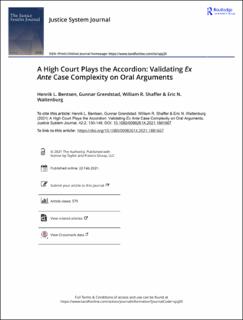| dc.contributor.author | Bentsen, Henrik Litleré | |
| dc.contributor.author | Grendstad, Gunnar | |
| dc.contributor.author | Shaffer, William R. | |
| dc.contributor.author | Waltenburg, Eric N. | |
| dc.date.accessioned | 2022-02-14T13:02:43Z | |
| dc.date.available | 2022-02-14T13:02:43Z | |
| dc.date.created | 2021-06-10T14:33:59Z | |
| dc.date.issued | 2021 | |
| dc.identifier.issn | 0098-261X | |
| dc.identifier.uri | https://hdl.handle.net/11250/2978822 | |
| dc.description.abstract | While high courts with fixed time for oral arguments deprive researchers of the opportunity to extract temporal variance, courts that apply the “accordion model” institutional design and adjust the time for oral arguments according to the perceived complexity of a case are a boon for research that seeks to validate case complexity well ahead of the courts’ opinion writing. We analyze an original data set of all 1,402 merits decisions of the Norwegian Supreme Court from 2008 to 2018 where the justices set time for oral arguments to accommodate the anticipated difficulty of the case. Our validation model empirically tests whether and how attributes of a case associated with ex ante complexity are linked with time allocated for oral arguments. Cases that deal with international law and civil law, have several legal players, are cross-appeals from lower courts are indicative of greater case complexity. We argue that these results speak powerfully to the use of case attributes and/or the time reserved for oral arguments as ex ante measures of case complexity. To enhance the external validity of our findings, future studies should examine whether these results are confirmed in high courts with similar institutional design for oral arguments. Subsequent analyses should also test the degree to which complex cases and/or time for oral arguments have predictive validity on more divergent opinions among the justices and on the time courts and justices need to render a final opinion. | en_US |
| dc.language.iso | eng | en_US |
| dc.publisher | Routledge | en_US |
| dc.relation.uri | https://doi.org/10.1080/0098261X.2021.1881667 | |
| dc.rights | Attribution-NonCommercial-NoDerivatives 4.0 Internasjonal | * |
| dc.rights.uri | http://creativecommons.org/licenses/by-nc-nd/4.0/deed.no | * |
| dc.title | A High Court Plays the Accordion: Validating Ex Ante Case Complexity on Oral Arguments | en_US |
| dc.type | Journal article | en_US |
| dc.type | Peer reviewed | en_US |
| dc.description.version | publishedVersion | en_US |
| dc.rights.holder | Copyright 2021 The Author(s) | en_US |
| cristin.ispublished | true | |
| cristin.fulltext | original | |
| cristin.qualitycode | 1 | |
| dc.identifier.doi | 10.1080/0098261X.2021.1881667 | |
| dc.identifier.cristin | 1915092 | |
| dc.source.journal | Justice System Journal | en_US |
| dc.source.pagenumber | 130-149 | en_US |
| dc.identifier.citation | Justice System Journal. 2021, 42 (2), 130-149. | en_US |
| dc.source.volume | 42 | en_US |
| dc.source.issue | 2 | en_US |

